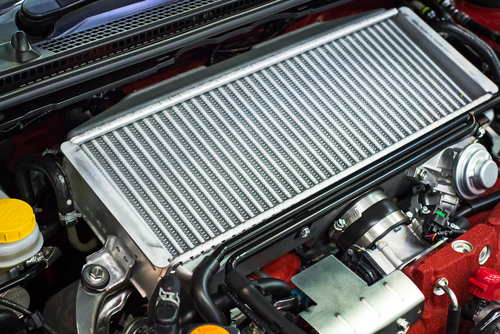The cooling system of any vehicle must include a radiator, which is essential for keeping the engine’s operating temperature safe. A frequent issue that can cause serious engine damage and decreased vehicle performance is radiator overheating. But what are the most common causes of a car radiator overheating? And how can this be prevented?
What are the most common causes of a car radiator overheating?
There are a number of common issues that can cause a car radiator to overheat, and these include:
- A lack of coolant
- A clogged radiator
- A broken radiator fan
- A faulty thermostat
- A damaged radiator hose
A lack of coolant can cause a car radiator to overheat
Lack of coolant is among the most frequent reasons for an overheating radiator. The heat produced by the engine must be absorbed and dissipated by the coolant and as a result, the engine will quickly overheat without enough coolant. This will raise the temperature gauge and activate the overheating warning system. A system leak, a bad radiator cap, or a broken water pump can all contribute to a low coolant level.
Clogged radiators can overheat
A blocked or clogged radiator is another factor in radiator overheating. The radiator can become clogged with dirt, debris, and other impurities over time, which restricts coolant flow and reduces the radiator’s capacity to absorb heat. A malfunctioning thermostat, water pump, or lack of maintenance can all lead to clogged radiators.
A broken fan can cause overheating
Another important cooling system component that, when it malfunctions, might lead to overheating is the radiator fan. The fan aids in moving air through the radiator, dispersing heat and preserving a safe operating temperature for the engine. When the fan breaks down, the radiator won’t get adequate airflow, which causes it to heat up. A damaged fan relay, a broken fan motor, or a damaged fan blade can all cause a malfunctioning fan.
A faulty thermostat can cause a car radiator to overheat
The thermostat is another component that can cause an overheating radiator when it fails. In order to maintain a safe operating temperature, the thermostat opens and closes as necessary to control the flow of coolant through the engine. When the thermostat malfunctions, it may either remain open, allowing the coolant to flow too quickly and diminishing its capacity to absorb heat, or it may remain closed, blocking the flow of coolant. Wear and tear or a broken temperature sensor are both potential causes of a broken thermostat.
A damaged radiator hose can cause overheating
Another frequent reason for radiator overheating is a broken or leaking radiator hose. A leak or other damage to the hose, which transports coolant from the engine to the radiator and back, may cause the vehicle to overheat. Wear and tear or a manufacturing flaw may be to blame for a damaged radiator hose.
For more information or for professional car radiator or auto air conditioning repair, get in touch with the team today, here at MRS Heat Transfer.

